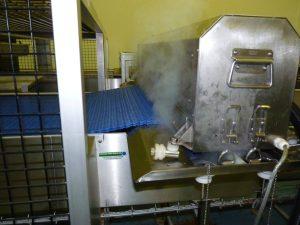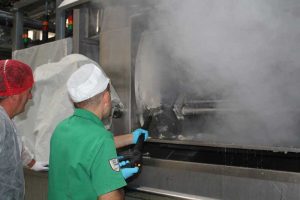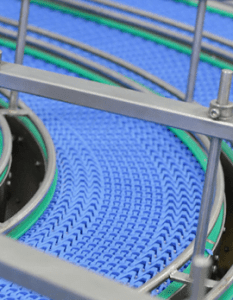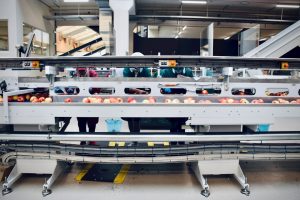In today’s fast-paced business environment, efficiency and productivity are crucial factors in determining a company’s success. Industrial cleaning plays a vital role in ensuring that operations run smoothly and without interruptions. By implementing regular and thorough cleaning practices, businesses can improve their efficiency and productivity in several ways.
Firstly, a clean and well-maintained workplace provides a conducive environment for employees to work in. A clutter-free and organised workspace can help employees focus on their tasks without distractions, leading to increased productivity. Moreover, regular cleaning of machinery and equipment can prevent breakdowns and malfunctions, ensuring that production processes run smoothly without any unexpected interruptions.
This ultimately leads to improved efficiency and output for the business. Furthermore, a clean and hygienic workplace can also have a positive impact on employee morale and motivation. Employees are more likely to take pride in their work environment when it is clean and well-maintained, leading to higher levels of engagement and productivity.
By investing in industrial cleaning practices, businesses can create a positive work environment that fosters productivity and efficiency.
Summary
- Implementing new technology can improve efficiency and productivity in the workplace
- Regular maintenance can help reduce overall maintenance costs for equipment
- Ensuring workplace safety can lead to a more productive and efficient work environment
- Adhering to hygiene standards is essential for the safety and well-being of employees
- Proper maintenance and care can extend the lifespan of equipment and machinery
- Minimising downtime through proactive maintenance and repairs can improve overall productivity
- Embracing environmental sustainability can lead to cost savings and a positive impact on the environment
Reduced Maintenance Costs
Preventing Wear and Tear
Regular cleaning and maintenance of machinery and equipment can help prevent the build-up of dirt, dust, and debris, which can cause wear and tear over time. By keeping equipment clean and well-maintained, businesses can reduce the need for costly repairs and replacements, ultimately saving on maintenance costs.
Early Identification of Issues
In addition, regular cleaning can also help identify any potential issues or problems with machinery and equipment early on, allowing for timely repairs and maintenance. This proactive approach to maintenance can help businesses avoid costly breakdowns and downtime, saving both time and money in the long run.
Extending the Lifespan of Assets
By preventing the build-up of dirt and debris, businesses can extend the lifespan of their assets, reducing the need for frequent replacements and upgrades. This not only saves on maintenance costs but also contributes to overall cost savings for the business.
Enhanced Workplace Safety

Workplace safety is a top priority for businesses across all industries. Industrial cleaning plays a crucial role in ensuring a safe and hazard-free work environment for employees. By implementing regular cleaning practices, businesses can enhance workplace safety in several ways.
Firstly, regular cleaning helps to remove any potential hazards or obstacles from the workplace, reducing the risk of accidents and injuries. Clean and clutter-free workspaces can help employees move around safely and efficiently, minimising the risk of slips, trips, and falls. Furthermore, regular cleaning of machinery and equipment can help prevent the build-up of hazardous materials or substances, reducing the risk of exposure to harmful chemicals or toxins.
This is particularly important in industries where employees are exposed to potentially dangerous materials on a daily basis. In addition, regular cleaning can also help identify any potential safety hazards or issues with machinery and equipment early on, allowing for timely repairs and maintenance. This proactive approach to safety can help prevent accidents and injuries, ultimately creating a safer work environment for employees.
Compliance with Hygiene Standards
In industries where hygiene standards are paramount, such as food processing or pharmaceutical manufacturing, industrial cleaning is essential for ensuring compliance with strict regulations and standards. By implementing thorough cleaning practices, businesses can ensure that their facilities meet the necessary hygiene requirements, avoiding costly fines and penalties. Regular cleaning helps to remove any potential contaminants or impurities from the workplace, ensuring that products are produced in a clean and sanitary environment.
This is particularly important in industries where hygiene is critical to the quality and safety of the end product. Furthermore, regular cleaning can also help prevent the build-up of bacteria or pathogens, reducing the risk of contamination and foodborne illnesses. By maintaining a clean and hygienic workplace, businesses can ensure that their products meet the necessary safety standards, protecting both consumers and their reputation.
In addition, regular cleaning practices can also help businesses stay ahead of any changes or updates to hygiene regulations, ensuring that they remain compliant at all times. By staying proactive with their cleaning practices, businesses can avoid any potential compliance issues and maintain a positive reputation within their industry.
Extended Equipment Lifespan
Industrial equipment represents a significant investment for businesses, making it crucial to maximise the lifespan of these assets. Regular industrial cleaning plays a key role in extending the lifespan of machinery and equipment, ultimately saving on replacement costs and contributing to overall cost savings for the business. By keeping machinery and equipment clean and well-maintained, businesses can prevent the build-up of dirt, dust, and debris that can cause wear and tear over time.
This helps to prolong the lifespan of assets, reducing the need for frequent replacements or upgrades. Furthermore, regular cleaning can also help prevent corrosion or damage to machinery and equipment caused by exposure to harsh chemicals or environmental factors. By implementing proper cleaning practices, businesses can protect their assets from premature deterioration, extending their lifespan and maximising their return on investment.
In addition, regular cleaning can also help identify any potential issues or problems with machinery and equipment early on, allowing for timely repairs and maintenance. This proactive approach to maintenance can help prevent premature wear and tear, ultimately extending the lifespan of assets for the business.
Minimised Downtime

The Importance of Regular Cleaning
Regular cleaning helps to remove any potential contaminants or impurities from machinery and equipment, reducing the risk of blockages or malfunctions. By keeping equipment clean and well-maintained, businesses can minimise the risk of unexpected downtime caused by equipment failures.
Proactive Maintenance and Cost Savings
Furthermore, regular cleaning can also help identify any potential issues or problems with machinery and equipment early on, allowing for timely repairs and maintenance. This proactive approach to maintenance can help prevent costly breakdowns and downtime, ultimately saving both time and money for the business.
A Clean and Efficient Workplace
In addition, a clean and well-maintained workplace can also contribute to the overall efficiency of operations, reducing the likelihood of delays or interruptions. By investing in industrial cleaning practices, businesses can create a conducive work environment that minimises the risk of downtime and maximises productivity.
Environmental Sustainability
In today’s environmentally conscious world, businesses are increasingly focused on sustainability and reducing their environmental impact. Industrial cleaning plays a key role in promoting environmental sustainability by minimising waste, conserving resources, and reducing harmful emissions. By implementing eco-friendly cleaning practices, businesses can reduce their reliance on harsh chemicals and detergents that can be harmful to the environment.
This not only reduces their environmental footprint but also creates a safer work environment for employees. Furthermore, regular cleaning helps to remove any potential contaminants or impurities from machinery and equipment, preventing pollution or environmental damage caused by improper waste disposal. By maintaining a clean and well-maintained workplace, businesses can minimise their impact on the environment and contribute to overall sustainability efforts.
In addition, regular cleaning practices can also help conserve resources by extending the lifespan of machinery and equipment. By preventing premature wear and tear through proper maintenance, businesses can reduce the need for frequent replacements or upgrades, ultimately conserving resources and reducing waste. Overall, industrial cleaning plays a crucial role in promoting environmental sustainability by minimising waste, conserving resources, and reducing harmful emissions.
By investing in eco-friendly cleaning practices, businesses can contribute to a cleaner and more sustainable future for all.
FAQs
What is an automatic conveyor cleaning system?
An automatic conveyor cleaning system is a mechanical system designed to clean and maintain conveyor belts and systems in industrial settings. It is typically equipped with brushes, scrapers, and other cleaning mechanisms to remove debris, dirt, and other contaminants from the conveyor belt.
What are the benefits of integrating an automatic conveyor cleaning system?
Integrating an automatic conveyor cleaning system can lead to improved efficiency, reduced downtime, and increased safety in industrial operations. It can also help to maintain product quality, extend the lifespan of conveyor belts, and reduce the risk of contamination in food and pharmaceutical production.
How does an automatic conveyor cleaning system improve efficiency?
By regularly cleaning conveyor belts and systems, an automatic conveyor cleaning system can prevent material buildup and blockages, leading to smoother and more consistent operation. This can result in increased throughput and reduced maintenance requirements, ultimately improving overall efficiency.
What industries can benefit from integrating an automatic conveyor cleaning system?
Industries such as food processing, pharmaceuticals, automotive manufacturing, and logistics can benefit from integrating an automatic conveyor cleaning system. Any industry that relies on conveyor systems to transport materials or products can potentially improve their operations with the use of such a system.
How does an automatic conveyor cleaning system contribute to safety in industrial settings?
By removing debris and contaminants from conveyor belts, an automatic conveyor cleaning system can help to reduce the risk of slip and fall accidents, as well as the potential for equipment damage or malfunction. This can contribute to a safer working environment for employees.










